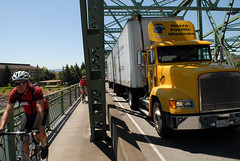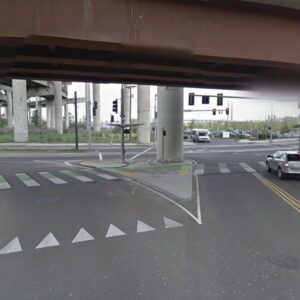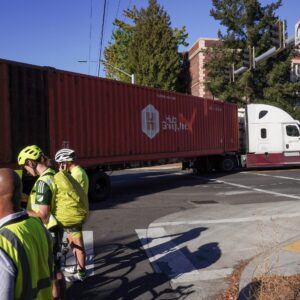A lobbying group that made headlines in June for trying to tilt a pot of Metro’s federal funds away from active transportation and toward freight projects now has a former top aide to Governor Ted Kulongoski to manage its communications efforts.
Hans Bernard, who handled transportation issues as the Governor’s legislative deputy director from 2007 to 2009, is now principal at Hubbell Communications, the public relations firm hired by BEST (Building the Economy through Sustainable Transportation), a coalition of business, industry, and freight interests.
Bernard worked for the State of Oregon for eight years, and was most recently involved in pushing through the highway-centric Jobs and Transportation Act of 2009 (a.k.a. H.B. 2001). The JTA is the transportation funding bill that drew the ire of environmental advocacy groups for its $840 million worth of earmarks for highway projects (including $192 million for the controversial Newberg-Dundee Bypass project).
After his success on H.B. 2001, Bernard took a post as legislative liaison for ODOT Region 1 (the region that includes Portland/Multnomah County). According to The Oregonian, Bernard’s main priority at ODOT was to “help advance the Columbia River Crossing,” a project his former boss, Governor Kulongoski, is a major supporter of.
The goal of BEST is to position freight projects — which include highway and bridge widening to relieve bottlenecks — as being essential to a green and prosperous economy. Bernard was able to convince Salem legislators that H.B. 2001 was a green transportation bill, so he’s likely to use the same approach in his new position. Active transportation advocates would be wise to take note of Mr. Bernard’s new role and sharpen up their arguments accordingly.
After the contentious vote last month over how to split $24 million in federal flexible funds between active transportation and freight projects, Metro is currently assembling a task force to decide which specific projects get funded. We should know who’s on that task force in the next week or so.
I’ve contacted Bernard for a comment on this story, but have yet to connect with him.







Thanks for reading.
BikePortland has served this community with independent community journalism since 2005. We rely on subscriptions from readers like you to survive. Your financial support is vital in keeping this valuable resource alive and well.
Please subscribe today to strengthen and expand our work.
the whole thing seems incredibly ironic…
Not a problem
All active transportation proponents need to do to get the funds tilted toward their interests is to outspend the other lobbiests.
That is the crux of the issue, isn’t it? Unfortunately that fact by its very nature enforces the first bias in the system. Freight interests benefit more financially from the current system than active transport interests, so they have more money to spend to ensure it stays beneficial to their interests.
Also, automakers spend money in “progressive” communities to assist proposals which maintain the systematic bias towards personal automobiles, putting local advocates at a further disadvantage.